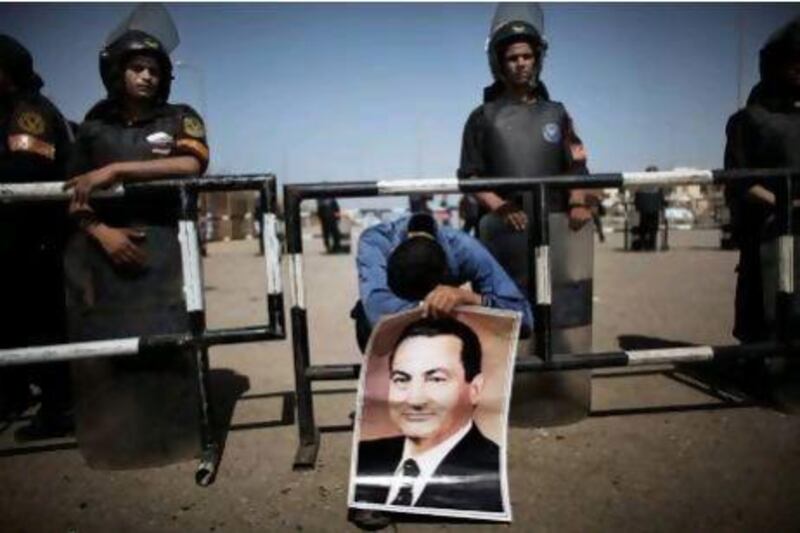Tahrir Square protesters who started it all, generals overseeing the transition to democracy, politicians elected to parliament or contesting the presidency: all three claim, unconvincingly, to speak for the new Egypt.
When it comes to making the political transition to a free democracy, Egypt is up against the same foe it has struggled with since Hosni Mubarak resigned last year - a crisis of legitimacy created by those who claim to speak for the nation.
First there are the protesters who took part in the uprising that forced Mubarak's abdication. They continue to demonstrate in the name of the "revolutionary" principles that spurred hundreds of thousands of Egyptians on to the streets during the 18-day uprising.
Up against them is the Supreme Council of the Armed Forces (Scaf), a group of military commanders who claim to speak on behalf of the country's quiet majority who want the restoration of stability.
Then there are the new political groups in parliament and the two presidential candidates who will go to a run-off vote on June 16 and 17, who all say their authority comes from the voting public.
The problem is that all three say they stand for the majority of ordinary Egyptians. In the 16 months since Mubarak stepped down, this power struggle has led to deadly confrontations on the streets and a parliament that has had little legislative success.
The constitution has not been rewritten and few of the figures of the old regime have been convicted of crimes. The result is a growing segment of society that does not believe the government is representing them properly.
The historic sentencing of Mubarak and Habib Al Adly, his minister of interior, to life imprisonment on Saturday revealed a battle still raging below the surface of calm that prevailed during the first round of presidential elections.
Those judgments and a powerful speech by Judge Ahmed Refaat led to a brief moment of joy, quickly overshadowed when Mubarak's sons were acquitted of corruption charges on technical grounds, while charges against six other security officials were dismissed because evidence against them was "unconvincing".
Tens of thousands converged again on Tahrir Square on Saturday and yesterday, demanding that Egypt's interim leaders deliver true justice.
The deterioration of trust in the justice system in Egypt represents a further weakening of the state as a whole, says Mazen Hassan, a professor of political science at Cairo University.
"Confidence was really shaken in this institution that historically had a high percentage of trust among Egyptians," he said. "This is part of a wider problem, where people are losing trust in all parts of the government. What we are seeing now is that protesters are still on the streets, rather than sending their demands through political representatives.
"People are coming to the conclusion that free and fair elections will not solve Egypt's problems."
One of the most aggravating factors in this crisis of legitimacy is the failure of a single leader, movement or political group with wide appeal and "revolutionary" credentials to emerge.
This has led to the polarising choice in the run-off elections scheduled in two weeks time between Mohammed Morsi, a prominent Muslim Brotherhood member, and Ahmed Shafiq, a former air force commander whose background is entwined with Mubarak's regime.
Mr Morsi and Mr Shafiq emerged as the front-runners because three centrist candidates split the vote among liberals, secularists and moderate Islamists, who together were the largest bloc in the first round.
But whoever wins the presidential elections will face his greatest challenge in trying to win support of this group: the politically active, highly mobilised centre.
The Morsi campaign has tried to seize on the perception that the Mubarak trial was mishandled on Saturday, saying it would push for new evidence to be collected and stronger charges applied to members of the old regime. For Mr Shafiq, the judgment was proof that Egypt would not go back to the old ways, because future leaders would be wary of abusing human rights and seeking autocratic powers.
Their different tactics for dealing with the judgment represented a question that Egypt's political groups are still trying to answer: can what happened between January 25 and February 11 last year be called a "revolution"?
In a sense, the disappointment in the verdicts was related to a wider disappointment that the true nature of the Mubarak regime - the crimes committed, the state-sponsored corruption and loss of stature in the region - has not been fully explored.
Protesters and liberal writers contend that Mubarak slowly led the country on to a path of economic and political ruin. By the end of his reign, they say, the state was drastically failing to make life better for the majority of its 83 million citizens and was instead devoting its energies to a plan to help Mubarak's son Gamal become the new president.
Former members of the National Democratic Party (NDP), many of whom are major supporters of Mr Shafiq, tend to favour the interpretation that the demands ringing out from Tahrir Square last year were for a new president, not a radical change of society and politics.
Abdallah Kamal, a former member of the NDP who was appointed to the upper house of parliament by Mubarak, and later served at a pro-regime newspaper Rose Al Youssef, described the 18 days of protests as a "revolutionary act, not a revolution".
Mr Kamal, who still refers to Mubarak as President Mubarak "out of respect", said that a true evaluation of the former president's legacy would not come for several years.
In the meantime, there would be great turbulence as politicians try to restore order and a sense of civil society.
"He was not a killer," Mr Kamal said of Mubarak. "He was not Satan, as some are trying to describe him."
Follow
The National
on
[ @TheNationalUAE ]
& Bradley Hope on
[ @bradleyhope ]





